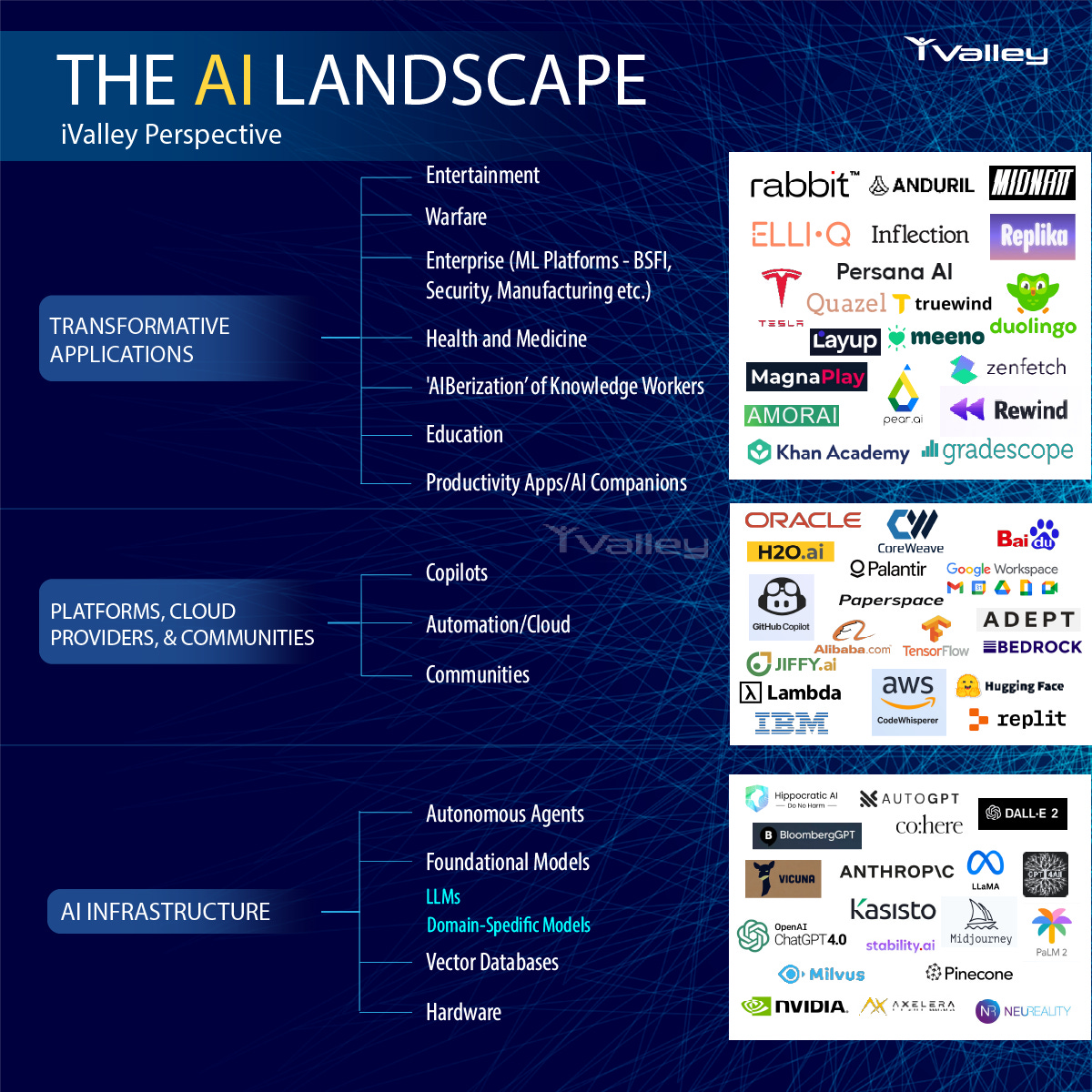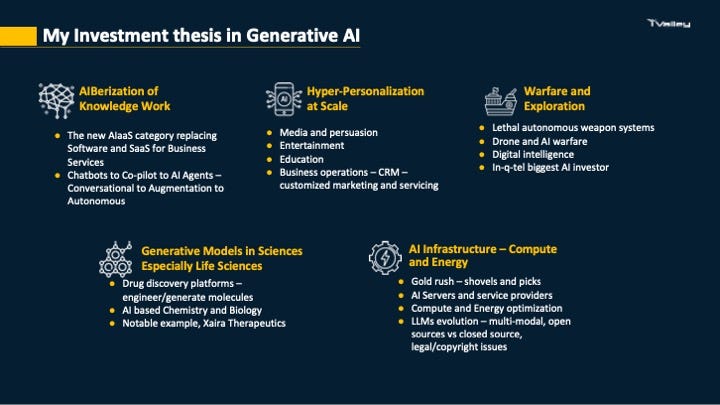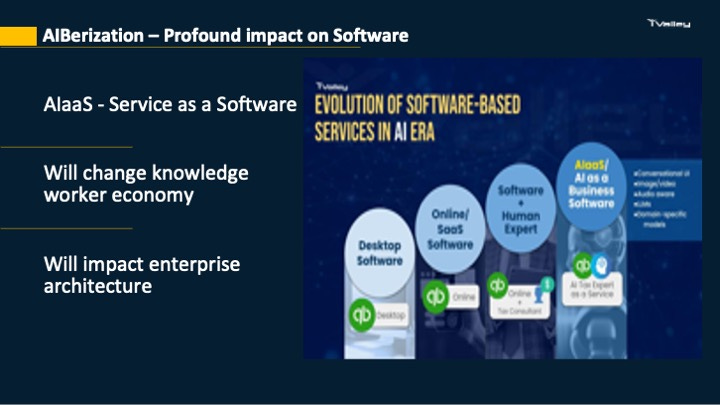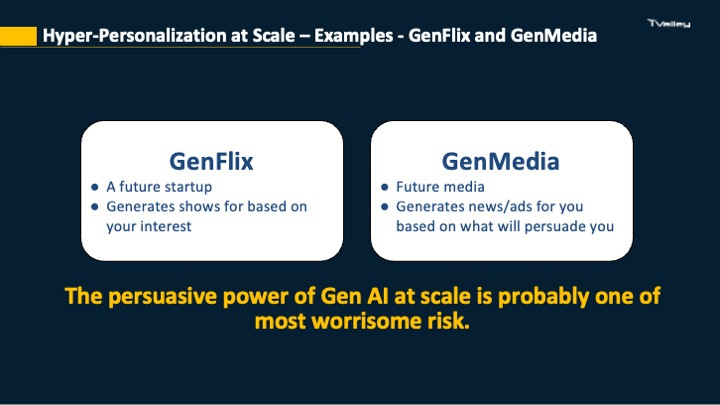Navigating the Future: The Profound Impact of Artificial Intelligence on Society and exploring its transformative power - Part 1
Redefining knowledge and the AIBerization of knowledge work. LLM adoption in the Enterprise and AI co-pilots and the ultimate enabler for minorities
This is Part 1 in a series of articles on Artificial Intelligence.
Artificial Intelligence (AI) was in the news pretty much all of 2023 with the culmination of the OpenAI board takeover likely due to the role AI can play in decision 2024 (more on this later in Part 2). AI technology is not new but its current iteration with tools like chatGPT has expanded access to consumers. AI is likely to remain forefront from infrastructure to applications for this decade and more. In this article, I encapsulate my thesis on the transformative influence of AI, asserting its role in reshaping society by redefining knowledge and consequently, the knowledge economy. In Part 2, I discuss, the capacity of AI to hyper-personalize interactions on a massive scale that will revolutionize persuasion in various realms (including shaping public opinions), entertainment, education, election campaigns, and service interactions, including in the field of healthcare. Multi-modal foundational models that can process real-time vision, and sound will alter warfare and explorations in oceans and outer space. Interface to AI will also evolve and will be more closely integrated with human intelligence; and brain-to-AI connections, leading to an evolutionary leap that will dwarf all the Artificial General Intelligence (AGI) talk today.
Subscribe today to be always in the know
AI's Impact: Transforming Society, Redefining Knowledge, and Unveiling Pivotal Opportunities
1 Redefinition Of Knowledge
The current breakthrough of AI is the foundational models (Large language models or LLMs) based on the transformer architecture. LLMs refer to advanced AI models designed to understand and generate human-like language. These models are part of the natural language processing (NLP) field and are capable of performing a wide range of language-related tasks. LLMs are trained on vast amounts of text data to learn the patterns, structures, and semantics of human language. They are redefining knowledge and will disrupt the knowledge economy.
Figure 1 - Seminal breakthroughs around knowledge for mankind
As illustrated in Figure 1 above, LLMs are likely going to prove to be historic and seminal breakthroughs right alongside the printing press, and the Internet which made knowledge and information widely available. LLMs will redefine what it is to know. Let me explain:
LLMs are trained in a vast corpus of texts and are incredibly proficient in their ability to predict the next best word in context. Think rote memorization of everything that is written. Traditionally human intelligence has emphasized knowledge as a foundation of conceptual blocks not just learning things by rote. For example, to know medicine is to know Biological concepts, how the cell works, and so forth, not just the literal text from the book. Now LLMs know the literal texts from the book, not just a book but they are trained in say all written texts known to humanity and they can predict the next word in large enough context which makes them appear to know everything they are trained on. An interface like chatgpt or WhatsApp AI makes that vast understanding available to everyone on their computing devices. So despite not having true knowledge of concepts and relationships in the traditional sense that humans currently view knowledge, LLMs are incredibly powerful tools that can generate realistic text and understand natural language. In some cases, they can even perform complex tasks such as language translation, summarization, sentiment analysis, and even answer tough exams meant to certify doctors and such. As AI continues to evolve, our definition of knowledge will likely continue to expand and adapt to these new developments.
The evolving definition of knowledge in the age of AI will have a significant impact on knowledge workers. As an extreme example, say you feed in the symptoms and your medical background, to a well-trained AI and a doctor and both arrive at different diagnoses which one would be considered right. Say that AI had passed the medical exam and had a wonderful track record. What is to know and who the experts are may evolve leading to an AI-supported knowledge economy.
2 AIBerization of knowledge work and disruption of knowledge worker economy
I call the AIBerization of knowledge work the phenomenon of disintermediation of knowledge workers by lesser skilled workers with the help of AI or entirely by AI.
Just like Uber made it easy for anyone to become a cabbie, AI can enable say an English major (without technical background) to become a programmer or designer, a bookkeeper to become a tax advisor, and so forth. AIBerization is already happening. Magnaplay is a startup that redefines how game studios localize their products without local translators. Truewind offers AI-powered bookkeeping and finance to small businesses. AmorAI now called Meeno is an AI-based relationship advisor/counselor started by none other than the former CEO of Tinder. Pair AI claims to be the Shopify for knowledge products, it allows knowledge workers to create educational videos and coaching services of their trade with AI without hiring a design agency or consultants.
3 And in the Enterprise
These examples are just the tip of the iceberg; Consulting firms like Accenture or their future competitors could become AI shops with very few human consultants. This AI-led transformation would eventually transform the enterprise architecture and the product development lifecycle at enterprises and tech companies.
The lifecycle of strategy, product management, development, testing, operations, and servicing will be managed predominantly with AI and domain-specific models. A domain-specific model can easily parse information that a product manager uses today and generate specifications for a code co-pilot like Microsoft’s Github Co-pilot that can generate or update the required code. A testing AI can validate and a conversational bot can service. Traditional back-office functions in an enterprise like product management and IT could become AI-managed just as front-office or interaction functions move to conversational interfaces.
Enterprise firms that adopt these strategies to create efficiencies and scale would have huge competitive advantages and firms that create new service offerings in this space would become valuable companies in this new AIBerizer category.
3.1 To LLM or not or to RAG or to use domain-specific models
Numerous patterns have emerged in the use of LLMs in Enterprises:
Use LLMs as is and incorporate them into workflows. The challenges are that LLMs are static as of their training, lack access to enterprise-specific data, can hallucinate and are compute-intensive and expensive. Therein comes the RAG.
RAG or Retrieval Augmented Generation in gen AI is a pattern or technique where enterprise-specific data is provided to LLMs at generation time to augment and customize LLM output.
In the RAG pattern, up-to-date or context-specific data is fetched from an external database and made available to the LLM when asking it to generate a response, alleviating the challenges above. Proprietary business data or information is stored in a Vector DB (typically) and the application fetches it for the LLM at generation time, reducing the likelihood of hallucinations. The result is a noticeable boost in the performance, accuracy, and customization of the GenAI application for the Enterprise.
The other approach is to build a domain-specific model for the enterprise from scratch or leverage industry-specific models. The CEO of Databricks that acquired MosaicML, Ali Ghodsi, a tool that helps enterprises to build domain-specific large models from scratch, stated in the Money2020 stage that it would be key for enterprises to have the ability to build their domain-specific models from scratch rather than use third-party LLMs like GPTx. I agree. Enterprise business knowledge that is today stored in ERP (or Core Banking), CRM, and Digital interaction systems and the knowledge of the people that support them will gradually migrate over to domain-specific models as enterprises undergo AI transformation.
3.2 The Co-pilot phase
AI Copilots are poised to become ubiquitous tools for various personas in the enterprise. These intelligent assistants leverage advanced artificial intelligence algorithms to provide seamless support and guidance across a wide range of domains. The biggest adoption of co-pilots is in programming and design. It is worth highlighting that within the technology industry, ~30% of all new code is generated with AI assistance through tools like ChatGPT, GitHub’s Copilot, and Amazon Code Whisperer. AI Copilots will become indispensable collaborators. They can assist professionals in tasks ranging from data analysis and problem-solving to project management. AI Co-pilots will serve as virtual teammates, offering valuable insights and suggestions to optimize decision-making processes. Tome is a startup that helps make presentations and docs faster. In healthcare, AI Copilots are enhancing patient care and medical decision-making. They can assist healthcare professionals in diagnosing illnesses, analyzing medical images, and recommending treatment plans. Besides incumbents in healthcare coming with these offerings, Corti is an AI for patient consultation that augments, automates, and analyzes virtual care and face-to-face patient engagements in clinical settings
4 AI will be the ultimate enabler esp. for minorities
The huge power of AI to scale can make the two-person startup unicorn a reality with AI doing the majority of the work. AI can become the scaling catalyst for startups and small businesses.
AI co-pilots could alleviate traditional challenges that some minority founders have had around recruiting technical talent.
Robert Smith, CEO of Vista Equity Partners, speaking at Davos remarks how AI is a big enabler and can benefit minorities. He noted that BigTech companies have expressed eagerness to engage with HBCUs and minority institutions to broaden their developer pool and also to ensure that minority students have a chance to contribute to the fabric of artificial intelligence so that it does not have any bias and these systems work for everyone. Minorities like African Americans and Hispanics are under-represented in the knowledge economy and AI and its enabling capability can leapfrog that representation.
Figure 2 - The AI landscape - an iValley perspective (for the detailed list of companies in each category subscribe and see tables in Part 2)
Subscribe today to get all premium content delivered right to your inbox.
Click here for Part 2 , preview below
“During a gold rush, sell shovels” What are the AI shovels?
IDC projects AI servers will grow at a 21% revenue CAGR from 2021-26 vs. 8% CAGR for the total server market, driving AI servers to grow from 18% of server industry revenue in 2022 to 27% of server industry revenue in 2026.
Who are the leaders and startups in this space and where are the biggest opportunities for investors and entrepreneurs?
A lot is discussed about LLMs but what are the Transformative Applications and Pivotal Use Cases
From Generated entertainment to personalized tutors to persuasion at scale, Generative AI promises to deliver hyper-personalization at scale as we have never seen before. I discuss how AI will shape the future in these realms. What are the best productivity improvement tools and AI companions?
And Lethal Autonomous Weapon Systems (LAWS) or how AI is changing the battlefield and warfare.
Two detailed lists of companies are included from iValley Research: AI infrastructure landscape including LLMs, Domain models, and leading AI startups and tech companies. And the leading AI Platforms, Co-Pilots, Apps and Services
Subscribe now and always be in the know.
Paddy Ramanathan Follow me on X @PaddyRamanathan
Founder of iValley (www.ivalley.co) and
Host of the FINTECHTALK™ Show (on Substack, Apple Podcast, YouTube, and Spotify)
Dr. Riad Hartani contributed to this article.
Check out some of the new episodes of FINTECHTALK podcasts on AI streaming on Apple, Spotify, or YouTube. Links below
Epilogue - Investment Thesis and future with AI
My 5 pronged thesis on AI investment - here is it in voice at the TGV event
How AI will have profound impact on how Software and SaaS will change, it will back to basics. Taking the digital shoe box to the AI tax preparer, mumbling some verbal instructions and voila your taxes are done
My favorite where entertainment and media are gen AI. Profound ethical and societal implications not about AI going rogue but those controlling AI will have massive influence power - sort of like what Big Tech and social media has today on distribution of information but this will change the factory of information not just distribution.







